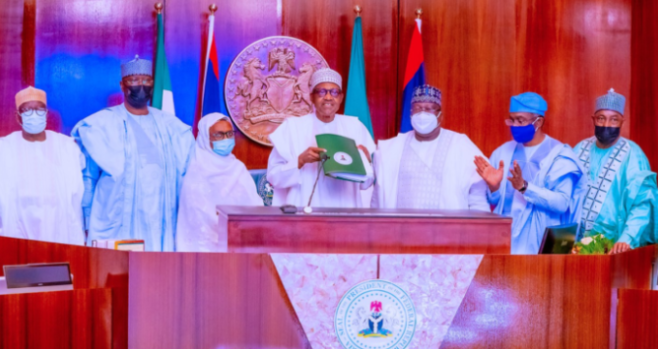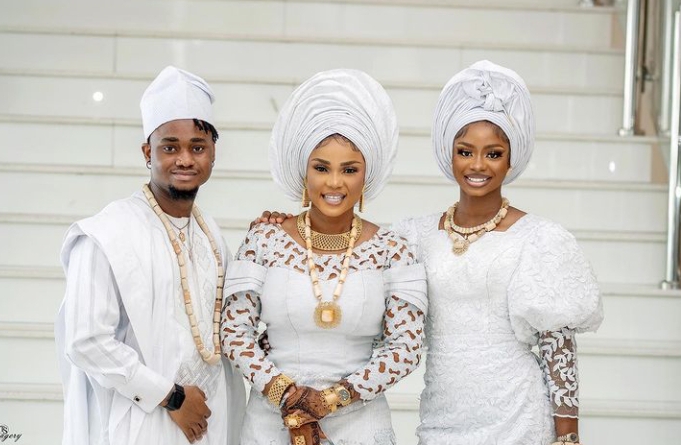Every once, in a while, Nigerians would compare Nollywood to other countries’ films. That wouldn’t have been so bad if the purpose were to seek ways for improvement. Usually, most of those doing this comparison come from the angle where almost everything Nollywood is denounced as inferior to whichever country’s films are being compared. And some of the films usually used to denigrate Nollywood are (South) Korean movies, series, etc (I’ll group them under K-drama). I’ve had cause to write against this in the past by simply pointing out that comparing Nollywood with Korean films is unfair and not a balanced comparison. Can you take K-drama out of its country of origin, South Korea? As I’ve asked in the past, can you take K-drama out of the country with Samsung, Hyundai, etc? People usually like to take Nollywood, or whatever industry in Nigeria that catches their fancy, out of the Nigerian context. But can any industry outperform the country it’s situated?
Although quite miraculously, many professions in Nigeria have managed to outperform the Nigerian conditions they find themselves in.
Now, let’s see what the stats say about Nigeria and South Korea. South Korea has a 51.78 million population to Nigeria’s estimated 206 million people. Judging by this alone, Nigeria has some advantage. However, if we were to match each country’s population with their GDP, I’m no economist, but there must be something to be said for South Korea’s GDP which according to the World Bank was 1.631 trillion USD in 2020. Share that among 51 million people and compare Nigeria’s 432.3 billion USD for the same period according to the World Bank. If the GDP figures don’t make too much sense, consider the fact that South Korea has the 4th largest economy in Asia and is said to be the 10th largest economy in the world. Nigeria on the other hand lives on its old glory as giant of Africa but became the poverty capital of the world in 2018. I’m not sure what the official figures or Nigeria’s status are now but if the complaints from millions of Nigerians are anything to go by, the economic hardship has got even worse.
At the end of the day, it’s not fruitful doing a direct comparison of Nollywood to K-drama. This doesn’t mean there aren’t things we can learn from them K-drama.
Advertisement
Suffice it to say that as far as stories are concerned, there are many K-drama stories Nollywood would’ve been seriously knocked for. However, my focus today isn’t on individual K-drama stories or films but overall feel of the films and series.
I have been watching a lot of South Korean drama (obviously) and I am always noticing obvious and subtle differences between them and films from other cultures. While I don’t support the Nollywood/Nigeria vs K. drama/South Korea comparison for the purpose of Nollywood bashing, I have taken to looking at South Korean films and series and focusing on similarities and differences between Nigeria and South Korea.
Rightly or wrongly, viewers see a country through the eyes of films and television. Whether we like or not, the closest some people will ever get to South Korea or Nigeria is through these films and TV series. And judging from K-drama, I’ve made some assumptions, sometimes subconsciously about the country.
Advertisement
Do the films portray one country better than the other? I suppose the question can also be asked whether films can do all the hard work. Can films do all the heavy lifting?
Talking of looking at Nigeria and South Korea through their movies, you’ll notice the fact that one country is richer than the other immediately. Nowhere is the economic difference between Nigeria and South Korea more obvious than in the lifestyles of a majority of the characters. In almost all the South Korean films and TV series I’ve watched, travelling abroad is done very easily so much so that even supposedly less privileged characters can save money and just travel to the US. There’s usually no mention of visa and the typical visa struggle we Nigerians are used to here is absent.
There are no pastors praying over people’s passports, no one is selling their family land to japa. I know there may exaggerations and some of the stories may be stretched to paint a certain picture in the K-drama stories, but the real-life stats support this portrayal.
Still on lifestyles, rich people in K-drama are made to look the part-from dressing to housing to food. I particularly like that the food is displayed in a visually very appealing manner. For some reason, Nigerian food doesn’t get properly displayed in our films. As for how the rich are portrayed in Nigerian films, we can’t blame Nollywood alone. In real life, Nigeria’s so called rich people don’t always display the best taste and style. Take a look at where the rich live, especially in Lagos for instance. Look at Victoria Island, Lekki, especially when it rains and tell me if that’s your idea of where the rich live or a place you dream of living in. All this, despite how expensive property is on the island.
Advertisement
There’s a lot more to be said but that will be another time when I’ll focus on specific K-drama projects and lessons we can learn from them. In the final analysis, I think beyond the obvious fact that South Korea’s obviously richer than Nigeria, what stands out the most for me is the way Korean culture is presented. Each time I finish a K-drama series and switch to a typical Hollywood series, I get a culture shock. Whereas in Nigeria we like to think that the only way to be modern or be international is by doing everything Hollywood says is good, K-drama doesn’t seem to care. Behaviour we would knock here as being ‘bush’ is celebrated in these works. But then again, is this behaviour portrayed in our films different from what we do in real life? As I’ve asked earlier, can you take a film industry outside its immediate environment?
1 comments







Thanks for this article. I understand your thought and the comparisons you’ve made. However, I believe that Nollywood is doing its best to create entertaining content that appeals to its Nigerian consumers. On the other hand, K/drama is strategic to promote Korean culture internationally hence everything is done to fit the taste of international fans such as now making sure one or two of the main actors speak English and the inclusion of foreign actors in their dramas. For example, in Itaewon Class, we saw a black actor taking up an active role. With these kind of strategies put in place, South Korea has now become a tourist dream and go-to for a lot of foreigners. Hence, I do not agree with them not caring about what goes on in Hollywood. Rather, they are strategic enough to use the Hollywood trends to create their unique content for the goal of promoting Korean culture.
It’s something Nollywood could learn from when there is a clear definition of what we want the world to know us for. In terms of showcasing the day-to-day living conditions in Nigeria, well Nollywood is doing its best. In fact, Nollywood has become a tool for shedding light on some moral decadence of society.
Thank you